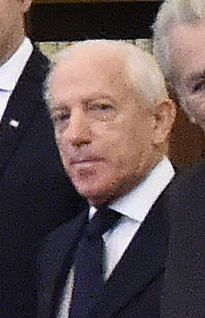Rogelio Pfirter
Rogelio Pfirter | |
|---|---|
 | |
| Ambassador of Argentina to the Holy See | |
| In office 23 December 2015 – 10 December 2019 | |
| Preceded by | Eduardo Valdés |
| Succeeded by | María Fernanda Silva |
| Director-General of the Organisation for the Prohibition of Chemical Weapons | |
| In office 25 July 2002 – 25 July 2010 | |
| Preceded by | José Bustani |
| Succeeded by | Ahmet Üzümcü |
| Ambassador of Argentina to the United Kingdom | |
| In office 1995–2000 | |
| Preceded by | Mario Cámpora |
| Succeeded by | Vicente Ernesto Berasategui |
| Personal details | |
| Born | 25 August 1948 Santa Fe, Argentina |
| Alma mater | Universidad Nacional del Litoral |
| Profession | Lawyer, diplomat |
Rogelio Pfirter (born 25 August 1948) is an Argentine diplomat who served as Argentina's ambassador to the United Kingdom and to the Holy See.[1] He was the Director General of the Organisation for the Prohibition of Chemical Weapons (OPCW) from 2002 to 2010.
Early and personal life
Pfirter was born in Santa Fe, Santa Fe Province, on 25 August 1948.[2][3] He graduated as a lawyer from the Universidad Nacional del Litoral. He is married to Isabel Serantes Braun.
Professional career
During his diplomatic career, Pfirter held various positions at the Argentine Foreign Ministry. In 1992 he was promoted to the rank of Ambassador and in the same year he became the Director of the Argentine-Brazilian Agency for Accounting and Control of Nuclear Materials (ABACC) and the Director of the Argentine Space Agency (CONAE). He was subsequently appointed Undersecretary for Foreign Policy at the Argentine Foreign Ministry. From 1995 to 2000, during the presidency of Carlos Menem, Pfirter was Argentina's ambassador to the United Kingdom.[4]
In 2002, Pfirter was unanimously elected the Director-General of the Organisation for the Prohibition of Chemical Weapons (OPCW) in The Hague, The Netherlands. He was elected for a second term in 2006. Pfirter’s tenure was praised as a time of consolidation and strengthening of the OPCW after the controversial departure of his predecessor José Bustani. Pfirter gathered support for chemical weapons destruction and as a manager he succeeded in administering the Secretariat with zero nominal growth (ZNG) for four years in a row.
After retiring in 2010, he became a member of the Global Council on Weapons of Mass Destruction at the World Economic Forum.
From 2015 to 2019, Pfirter was Argentina's ambassador to the Holy See. Pfirter was appointed by President Mauricio Macri to succeed Eduardo Valdés, upon Pope Francis's suggestion.[4] During Pfirter's ambassadorship, Macri and Pope Francis met on two occasions. Pfirter stepped down upon the election of Alberto Fernández as president in 2019; he was succeeded by María Fernanda Silva.[5][6]
Awards
Pfirter has received a number of international awards including Grand Cross of the Orden of Merit from Chile as well as Germany; Officier of the Legion of Honour from France and Commandeur of the Order of Orange-Nassau from the Netherlands.
References
- ^ "Interview With Pfirter, Director-General of the Organisation for the Prohibition of Chemical Weapons". Armscontrol.org. 23 September 2005.
- ^ "Rogelio Pfirter". Fundación Konex (in Spanish). 2018. Retrieved 6 July 2021.
- ^ Agasso Jr., Domenico (18 May 2019). ""El profesor Bergoglio animaba los valores espirituales de los alumnos"". La Stampa (in Spanish). Retrieved 6 July 2021.
- ^ a b Niebieskikwiat, Natasha (15 December 2015). "Designan al diplomático Rogelio Pfirter embajador ante el Vaticano". Clarín (in Spanish). Retrieved 6 July 2021.
- ^ Lejtman, Román (30 November 2019). "Qué perfil de embajador en el Vaticano pidió Francisco al futuro gobierno peronista". Infobae (in Spanish). Retrieved 6 July 2021.
- ^ "El Vaticano otorgó el plácet a María Fernanda Silva". Télam (in Spanish). 11 February 2020. Retrieved 6 July 2021.
- Living people
- 1948 births
- People from Santa Fe, Argentina
- Directors-general of the Organisation for the Prohibition of Chemical Weapons
- Grand Crosses 1st class of the Order of Merit of the Federal Republic of Germany
- Officiers of the Légion d'honneur
- Commanders of the Order of Orange-Nassau
- Ambassadors of Argentina to the Holy See
- Ambassadors of Argentina to the United Kingdom
